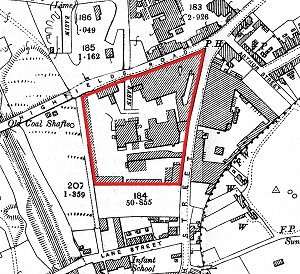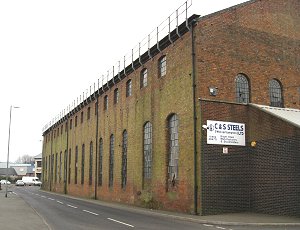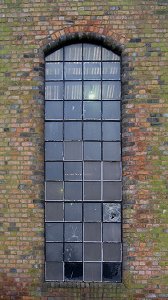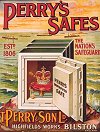1. Early Company History
The firm was founded as iron founders by Thomas Perry in 1806. A
trade directory of 1818 listed Thomas Perry as an iron merchant trading
in the Highfields district of Bilston.
By 1850 the firm was certainly well established and were noted in a
trade directory as iron founders and manufacturers of wrought iron
bedsteads, fencing, hurdles, railing, gates, palisades and other wrought
iron and cast iron work. A book issued by the company in 1967 says
that "the company started as a general iron foundry and produced heavy
and elaborate cast iron railings, gates, coats of arms and the like,
still to be seen in the old residential districts of London and other
cities. In 1848 it produced bridge castings for the Great Western
Railway. It made rolling mills for rolling wrought iron, steel and
non-ferrous metals and auxiliary mill machinery including shears and
rtoll lathes and steam engines to drive them; two foundries were
built for the making of large and cast iron roll mills."
At some point they started specialising in the heavier end of the trade
and they seem to have got into the production of armour plate, for war
ships and gun batteries, quite early on.
 |
Perry's site in Bilston on the
1902 Ordnance Survey map. The site is at the
junction of Highfield Road and Ash Street. Perry's at
some time owned premises on the other side of Ash Street but
there are no details of this.
There was a canal basin that served
the factory from the BCN. |
Griffith's Guide to the Iron Trade of Great Britain, 1873 says:
We know of no concern which has done more to raise the character for
engineering skill in the Black Country than Thomas Perry & Sons. This is
a highly respectable old firm engaged in metallurgical pursuits. 50
years since - the firm then was Thomas Perry - the family resided at
Bilston, and as there were at that time numerous Perrys in business, Mr.
Perry, to distinguish him, was always called ‘Gentleman Perry,' and was
highly esteemed and loved by all classes. Mr. Perry, with Mr. Sparrow,
was one of the founders of the Bilston District Bank, and remained a
director until his death.
He was quiet, unostentatious, always a gentleman, was never known to
forget himself or become agitated in business; he was amiable and polite
to all; a great friend to his church and the clergy; a man of spotless
and the highest reputation. In the social circle at home for goodness he
was unequalled in all Staffordshire; so amiable, so gentle, truly polite
and kind was Mr. Perry in his own family to each member to the day of
his death, although he lived to an advanced age. Mr. Charles T., the
eldest son, married Harriet, the third daughter of the late G. B.
Thorneycroft, Esq., the first mayor of Wolverhampton and the founder of
the firm of G. B. Thorneycroft & Co. Mr. Thomas Perry, the second son,
is now at the head of the concern under review.
This foundry has a world-wide fame, and has done more in supplying
new machinery and appliances, abreast with the rapid progress the Iron
trade has made during the last ten years, than many other
establishments.
| Griffiths' general assessments of people and companies often
seem motivated more by a desire to please potential advertiser
in his book and his journal than by strict accuracy.
(Indeed the very next entry reads: "We know of no concern which
has done more to raise the character for engineering skill in
the Black Country than Thomas Ping & Sons" which is exactly the
formula he used for Perrys.) But Griffiths' remarks on what
companies actually did are generally more reliable. Of
Perry's he records: |

An older part of the
Perry works, facing Highfield Street, as it is today. |
Steam engines and all kinds of machinery are their great
specialities, with all modern inventions in rolls and machinery in
Ironworks. At this foundry the choicest brands of pig Iron are kept in
large quantities, including Lilleshall, Madeley Wood, Blaenavon,
Weardale, and different Swedish brands, mixed in proportions known only
to Perry & Sons, to make soft and chilled rolls, for rolling plates,
sheets, armour plates, &c., &c.; for the manufacture of which this firm
is justly celebrated.
Here some of the rolls used at the Earl of Dudley's, W. Barrows &
Sons, the Barrow Steel Company, Robert Heath & Sons, the Blochairn in
Scotland, and most other great concerns, are made.
From this it would appear that by 1873 Perrys, now under Thomas Perry's
second son (another Thomas Perry), was specialising in making rolled plate,
especially armour plate, and in making rolling mills and other foundry
machinery.

Window in the old part of the works. |
George T. Lawley, in his A History of Bilston in the
County of Staffordshire, printed and published by John
Price, Market Place, Bilston, 1893, writes, at pp.247-248:
Vast foundries, where every conceivable article of machinery and skill is
made, still exist in this town. The manufactured goods produced by Thomas
Perry & Co, of Highfields – established in 1806 – for excellence of material
and workmanship have competed with and rivalled the manufactures of the
whole world. The enormous "plants" for the manufacture of steel armour
plates for war ships and batteries, have been made here. Huge engines –
masterpieces of strength, size, and mechanical superiority – are also
numbered among its productions. The "testing" of the "castings" previous to
their being sent from the works to their destination, enables the workmen to
detect any unsoundness or faults, and insures to the purchaser a genuine
article.
|
Orders are executed for countries situated in every quarter of
the globe; nor are our own government orders rare either. The "fire
and thief proof safes" made by them have justly attained a wide
celebrity. Several monster safes have been made by this firm for
foreign governments, which are wonders of skill, strength and
ingenuity. The firm also does an immense trade in brass bedsteads."
At some point, therefore, Perrys had decided that their armour plate
gave them a good entry point for making safes. The brass bedsteads
seem to be a hangover from the lighter kinds of work recorded as being
carried out in 1850. There were many firms in Bilston making brass
and iron bedsteads.
The continuing story is told in the following parts:
|

